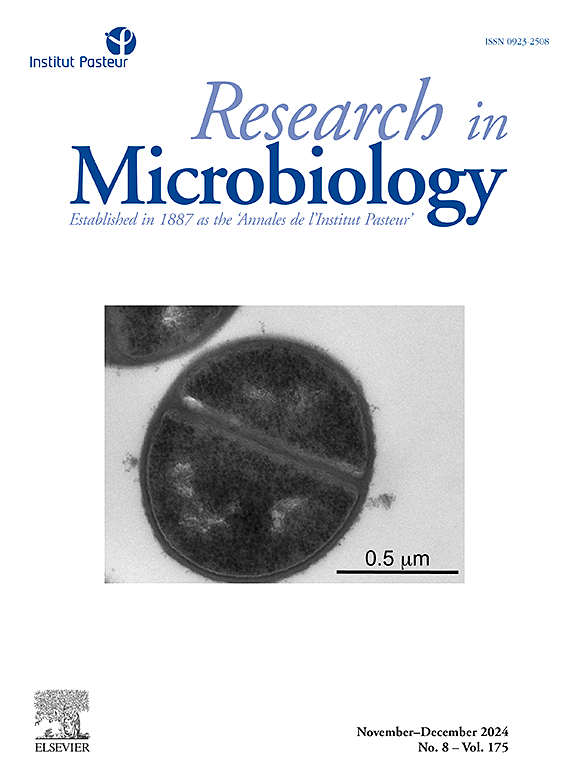Endophyte mediated biocontrol mechanisms of phytopathogens in agriculture
IF 2.5
4区 生物学
Q3 MICROBIOLOGY
引用次数: 0
Abstract
The global human population is growing and demand for food is increasing. Global agriculture faces numerous challenges, including excessive application of synthetic pesticides, emergence of herbicide-and pesticide-resistant pathogenic microbes, and more frequent natural disasters associated with global warming. Searches for valuable endophytes have increased, with the aim of making agriculture more sustainable and environmentally friendly. Endophytic microbes are known to have a variety of beneficial effects on plants. They can effectively transfer nutrients from the soil into plants, promote plant growth and development, increase disease resistance, increase stress tolerance, prevent herbivore feeding, reduce the virulence of pathogens, and inhibit the growth of rival plant species. Endophytic microbes can considerably minimize the need for agrochemicals, such as fertilizers, fungicides, bactericides, insecticides, and herbicides in the cultivation of crop plants. This review summarizes current knowledge on the roles of endophytes focusing on their mechanisms of disease control against phytopathogens through the secretion of antimicrobial substances and volatile organic compounds, and the induction of systemic resistance in plants. Additionally, the beneficial roles of these endophytes and their metabolites in the control of postharvest diseases in plants have been summarized.
内生菌介导的农业植物病原体生物控制机制。
全球人口在不断增长,对粮食的需求也在不断增加。全球农业面临着诸多挑战,包括合成杀虫剂的过度使用、抗除草剂和杀虫剂的病原微生物的出现以及与全球变暖相关的自然灾害日益频繁。为了使农业更可持续和更环保,人们越来越多地寻找有价值的内生微生物。众所周知,内生微生物对植物有多种有益作用。它们能有效地将土壤中的养分转移到植物体内,促进植物生长发育,增强抗病能力,提高抗逆性,防止食草动物啃食,降低病原体的毒力,抑制敌害植物物种的生长。内生微生物可以在很大程度上减少作物栽培过程中对肥料、杀菌剂、杀虫剂和除草剂等农用化学品的需求。这篇综述总结了目前有关内生菌作用的知识,重点是它们通过分泌抗菌物质和挥发性有机化合物来控制植物病原体的病害以及诱导植物产生系统抗性的机制。此外,还总结了这些内生菌及其代谢物在控制植物收获后病害方面的有益作用。
本文章由计算机程序翻译,如有差异,请以英文原文为准。
求助全文
约1分钟内获得全文
求助全文
来源期刊

Research in microbiology
生物-微生物学
CiteScore
4.10
自引率
3.80%
发文量
54
审稿时长
16 days
期刊介绍:
Research in Microbiology is the direct descendant of the original Pasteur periodical entitled Annales de l''Institut Pasteur, created in 1887 by Emile Duclaux under the patronage of Louis Pasteur. The Editorial Committee included Chamberland, Grancher, Nocard, Roux and Straus, and the first issue began with Louis Pasteur''s "Lettre sur la Rage" which clearly defines the spirit of the journal:"You have informed me, my dear Duclaux, that you intend to start a monthly collection of articles entitled "Annales de l''Institut Pasteur". You will be rendering a service that will be appreciated by the ever increasing number of young scientists who are attracted to microbiological studies. In your Annales, our laboratory research will of course occupy a central position, but the work from outside groups that you intend to publish will be a source of competitive stimulation for all of us."That first volume included 53 articles as well as critical reviews and book reviews. From that time on, the Annales appeared regularly every month, without interruption, even during the two world wars. Although the journal has undergone many changes over the past 100 years (in the title, the format, the language) reflecting the evolution in scientific publishing, it has consistently maintained the Pasteur tradition by publishing original reports on all aspects of microbiology.
 求助内容:
求助内容: 应助结果提醒方式:
应助结果提醒方式:


